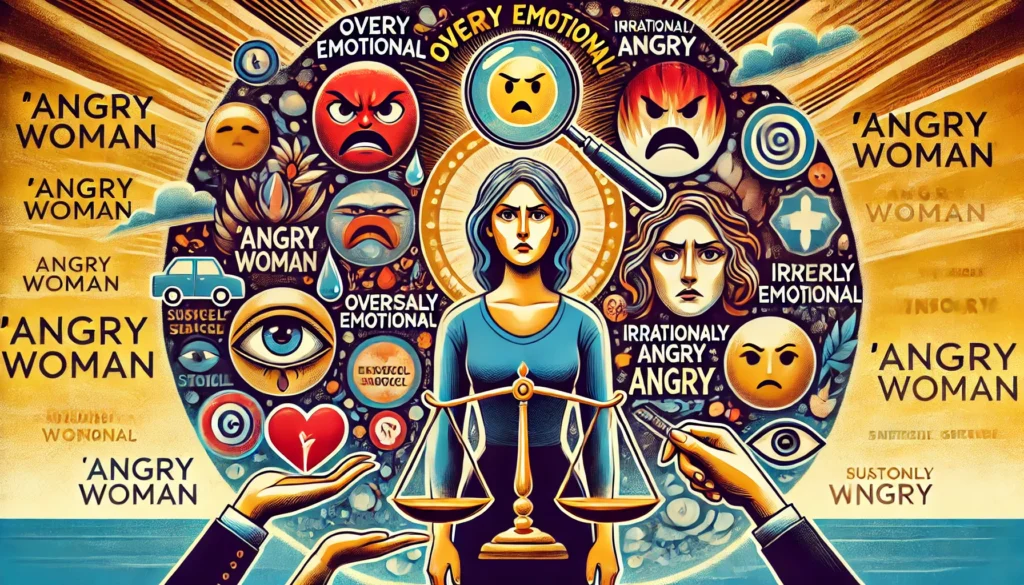Understanding the Angry Woman Stereotype
The “angry woman” stereotype is a prevalent cultural trope that often depicts women as overly emotional or irrationally angry. This stereotype can be damaging, leading to misinterpretations of women’s expressions of dissatisfaction or assertiveness as disproportionate anger. By exploring the roots and implications of this stereotype, we can better understand its impact on women’s social interactions and mental health.

Historical Context and Cultural Perceptions
The angry woman stereotype has deep historical roots, with societal expectations about women’s behavior often dictating that they should be passive, nurturing, and compliant. When women express anger or dissatisfaction, it contradicts these traditional roles, leading to labeling behavior as abnormal or unwelcome. Historically, women displaying anger have been dismissed as hysterical—a term derived from the Greek word for uterus, ‘hystera,’ reflecting the long-standing association of emotional expressiveness in women with irrationality and instability.
In various cultures, the portrayal of the angry woman has been used to justify unequal treatment. For example, in many professional settings, women who express anger might be judged more harshly than their male counterparts, who are often seen as assertive or decisive when they display the same emotion. This double standard can hinder women’s career progression and affect their willingness to speak up or assert themselves in the workplace.
The media also plays a significant role in perpetuating the angry woman stereotype. Television, movies, and social media often depict angry women as comic relief or as unstable characters, which reinforces the idea that women’s anger is not to be taken seriously. This portrayal can influence public perception and skew the way women’s emotions are interpreted in real life.
Despite these challenges, the narrative is slowly changing as more attention is given to gender equality and emotional intelligence. Movements that promote the understanding and normalization of female anger, such as feminist activism, are challenging outdated stereotypes and advocating for a more nuanced view of women’s emotional experiences.
Understanding the historical and cultural context of the angry woman stereotype is essential for dismantling it and promoting more equitable social interactions. It also helps in recognizing the bias that might influence one’s perception of women’s emotions.
Psychological Impact of Stereotyping
The angry woman stereotype can have profound psychological effects on women who find themselves boxed into this narrow characterization. Consistently being labeled as angry or emotional can lead to internalized stigma, affecting women’s self-esteem and mental health. Women might begin to suppress their emotions to avoid the stereotype, leading to increased stress and, potentially, psychological issues like anxiety and depression.
Suppressing emotions is not only harmful to individual mental health but can also impact physical health. Research has shown that habitually suppressing emotions can increase the risk of cardiovascular diseases and impair immune function. For women who feel pressured to consistently mask their anger to conform to societal expectations, the health implications can be significant.
The stereotype also affects interpersonal relationships. Women may feel misunderstood or marginalized, which can hinder effective communication and intimacy in personal and professional relationships. The fear of being stereotyped can discourage women from expressing legitimate grievances, leading to unresolved conflicts and dissatisfaction.
Moreover, the internal conflict between experiencing anger and feeling unable to express it can lead to what psychologists call “emotional dissonance,” a state of tension that arises from the discrepancy between felt and expressed emotions. This state can contribute to the development of burnout, particularly in high-stress environments like the workplace.
Encouraging women to express a full range of emotions healthily is crucial for mental well-being. Mental health professionals can help by validating women’s feelings and providing strategies for managing and expressing emotions in a way that feels authentic and constructive.
Social Dynamics and Changing Narratives
Changing the narrative around the angry woman stereotype involves acknowledging the legitimacy of women’s anger. Social change can be facilitated through education and awareness, promoting an understanding that like men, women’s anger can be a healthy, natural response to injustice, stress, or frustration.
Initiatives in schools and workplaces to educate about gender stereotypes and their effects can help alter perceptions. These programs should focus on emotional intelligence, teaching individuals to interpret and respond to emotions in a gender-neutral manner. This education can help dismantle stereotypes by emphasizing that emotional responses are a human trait, not confined to a specific gender.
In the media, more accurate and diverse representations of women’s emotions can help shift public perceptions. Highlighting stories where women’s anger leads to positive change or is shown as part of a rational and considered response can alter the stereotype. Public figures and influencers can also play a role by openly discussing the topic and sharing personal experiences that challenge the typical narrative.
Support groups and online forums provide safe spaces for women to express their emotions and share experiences related to this stereotype. These platforms can be instrumental in building communities that affirm and validate women’s feelings, helping to counteract the negative implications of the stereotype.
As society progresses, it’s vital to continue advocating for a balanced representation of all emotions across genders, encouraging a culture that allows women the same freedom to express anger without negative repercussions as men.
For individuals struggling with the implications of this stereotype, platforms like Lumende offer access to mental health professionals who can provide support and guidance. Therapy can be a valuable resource for anyone seeking to understand and navigate the complexities of emotional expression within the context of societal expectations.

 English
English
 Deutsch
Deutsch Français
Français